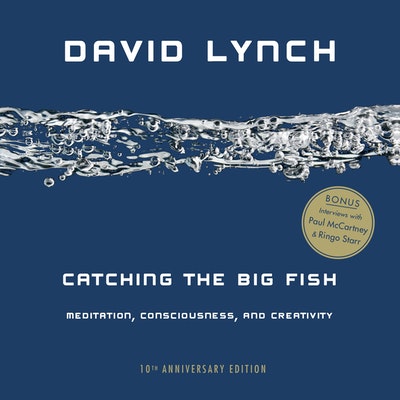- Published: 17 October 2016
- ISBN: 9780143130147
- Imprint: Tarcher
- Format: Paperback
- Pages: 208
- RRP: $34.99
Catching The Big Fish
- Published: 17 October 2016
- ISBN: 9780143130147
- Imprint: Tarcher
- Format: Paperback
- Pages: 208
- RRP: $34.99
The quirky helmer known for Boy Scout demeanor and twisted tales shares his creative vision in a surprisingly gentle tome informed by the underlying teachings of Transcendental Meditation. But don’t worry: David Lynch, one-time creator of “The Angriest Dog in the World” comic, keeps the proselytizing to a minimum. He addresses topics ranging from working with wood (for it) to director’s commentaries (against) in deceptively simple, yet ultimately affirming, chapters. There’s much for fans and aspiring filmmakers to enjoy
Variety
Ideas are like fish. If you want to catch little fish, you can stay in the shallow water. But if you want to catch the big fish, you’ve got to go deeper,” says David Lynch the idiosyncratic filmmaker whose creations include Eraserhead, Blue Velvet, Mulholland Drive, Inland Empire, and the cult TV classic, Twin Peaks. He claims that he has savored the pleasures of diving deep thanks to a 33-year practice of Transcendental Meditation (TM). He describes the fun of gathering what he calls “firewood” (all kinds of ideas and things for a film), the joy he takes in seeing an aging building or a rusted bridge, and the respect he has for Fellini and Kubrick. Lynch loves making movies and diving deep, and this testament bears witness to both loves
Spirituality & Practice
In Catching the Big Fish: Meditation, Consciousness, and Creativity, David Lynch puts aside his filmic quest to get inside the viewer’s head and lets them instead inside his, an invitation almost as rare as a ticket to fiction’s Wonka Chocolate Factory, and possibly just as out of this world. Catching the Big Fish is a blend of thoughts and themes, sometimes random like a stream of consciousness, or — the analogy he personally prefers for creativity — casting a hook into a bottomless sea. The book melds biography, film analysis, philosophy and spirituality with a heart-on-sleeve sincerity, while incorporating a narrative of the author’s passion for charting the world of dreams and ideas and rendering them unto action
BlogCritics
With this book, Lynch offers us a rare glimpse into his own head. In the process, he reveals just enough biographical information, philosophy of film, and general behind-the-scenes dirt (including the connection between Lynch’s Lost Highway and O. J. Simpson)to keep the attention of those more interested in Lynch’s films than in his consciousness
Booklist


